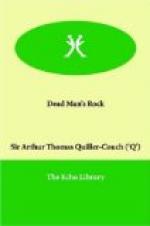“‘I think,’ said he, slowly, ’there is something in it. My father had his crotchets, it is true; but he was no fool. He never opened his lips to me on the matter, but left me to hear the first of it in his last Will and Testament. Oddly enough, our fathers seem both to have found religion in their old age. Mine took his comfort in the Presbyterian shape. But it is all the same. There was some reason for your father to repent, if rumours were true; but why mine, a respectable servant of the East India Company, should want consolation, is not so clear. Maybe ’twas only another form of egotism. Religion, even, is spelt with an I, ye’ll observe.
“‘An odd couple,’ he continued, musing, ’to be mixed up together! But we’ll let them rest in peace. I’d better let you have what was entrusted to me, and then, mayhap, ye’ll be better able to form an opinion.’
“With this he rose and stepped back into the lighted room, whilst I followed. Drawing a bunch of keys from his pocket, he opened a heavy chest of some dark wood, intricately carved, which stood in one corner, drew out one by one a whole pile of tin boxes, bundles of papers and heavy books, until, almost at the very bottom of the chest, he seemed to find the box he wanted; then, carefully replacing the rest, closed and fastened the chest, and, after some search among his keys, opened the tin box and handed me two envelopes, one much larger than the other, but both bulky.
“And here, my dear Margery, with my hand upon the secret which had cost us so much anxious thought and such a grievous parting, I could not help breathing to myself a prayer that Heaven had seen fit to grant me at last some means of comforting my wife and little one and restoring our fallen house; nor do I doubt, dear wife, you were at that moment praying on your knees for me. I did not speak aloud, but Mr. Sanderson must have divined my thoughts, for I fancied I heard him utter ‘Amen’ beneath his breath, and when I looked up he seemed prodigiously red and ashamed of himself.
“The small envelope was without address, and contained 50 pounds in Bank of England notes. These were enclosed without letter or hint as to their purpose, and sealed with a plain black seal.
“The larger envelope was addressed in my father’s handwriting—”
’TO THE SON OF MY HOUSE WHO, HAVING COUNTED ALL THE PERILS, IS RESOLUTE.
’Mem.—To be burned in one hundred years from this date, May 4th, in the year of our Lord MDCCCV.’
“It likewise was sealed with a plain black seal, and contained the manuscript which I herewith pin to this leaf of my Journal.”
[Here Uncle Loveday, who had hitherto read without comment, save an occasional interjection, turned the page and revealed, in faded ink on a large sheet of parchment, the veritable writing of my grandfather, Amos Trenoweth. We both unconsciously leaned further forward over the relic, and my uncle, still without comment, proceeded to read aloud as follows:—]




